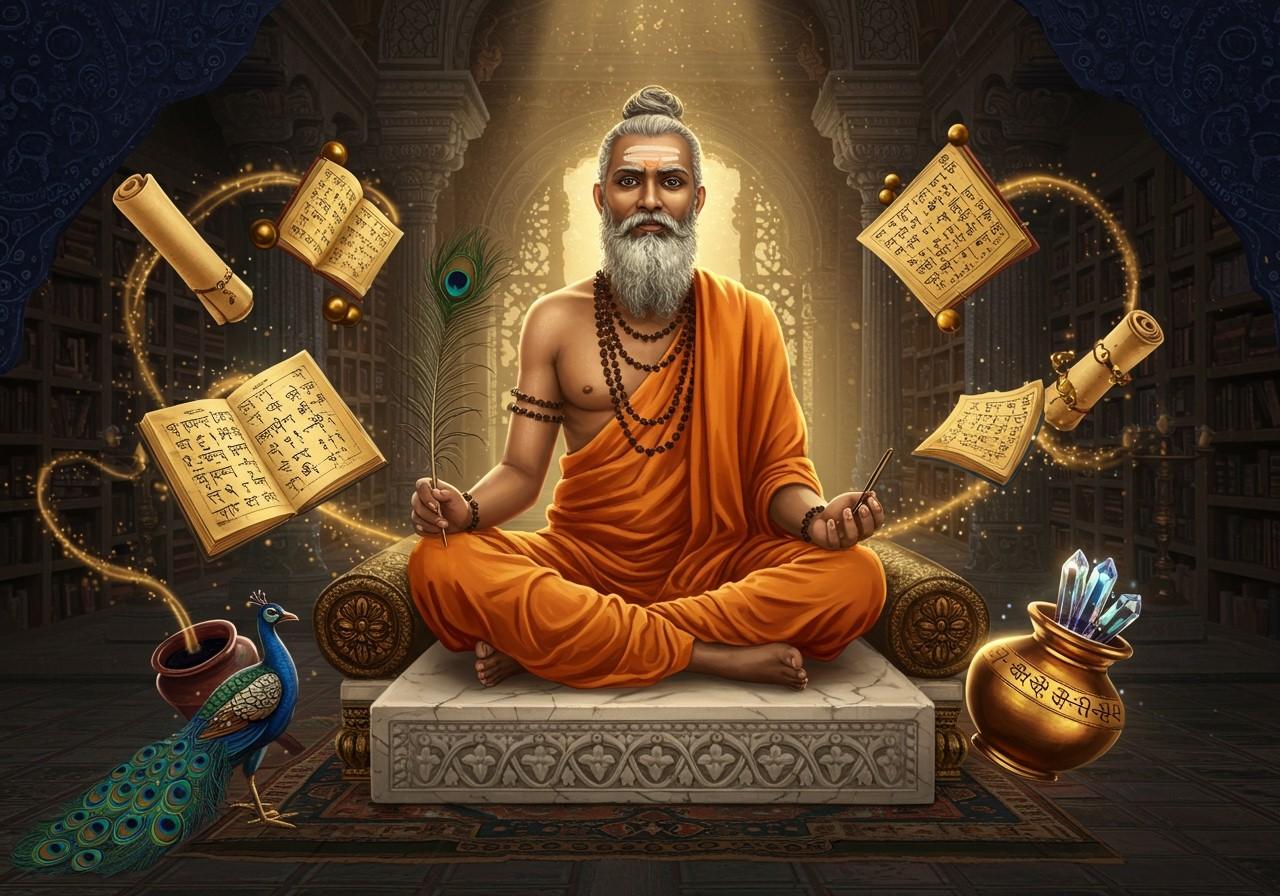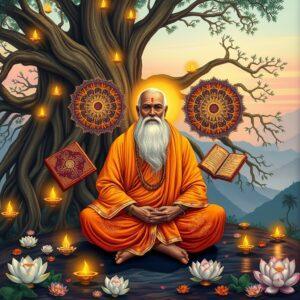
Vatsyayana, a respected scholar from the Gupta period (4th-6th century CE), significantly enriched classical Indian literature. His profound insights into the socio-cultural and philosophical dynamics of ancient India, particularly evident in his magnum opus, the Kama Sutra, continue to fascinate scholars and readers alike. This blog post delves into Vatsyayana’s literary contributions, exploring the depth of his writings and their enduring impact.
Vatsyayana’s Background
Flourishing during the Gupta era—a period marked by remarkable cultural and intellectual advancements—Vatsyayana’s scholarship reflects the diverse schools of thought that shaped his intellectual landscape. His writings offer a glimpse into the socio-cultural norms and values of his time, primarily focusing on sexuality, ethics, and the intricacies of human behavior. These works are essential for comprehending the broader spectrum of Sanskrit literature. While the Kama Sutra remains his most celebrated work, it is possible he authored other, lesser-known texts.
The Kama Sutra: Vatsyayana’s Magnum Opus
Written in the 2nd century CE, the Kama Sutra stands as Vatsyayana’s most renowned work. This ancient Indian Hindu Sanskrit text explores the multifaceted dimensions of human relationships, love, and sexuality, emphasizing a harmonious balance between pleasure, duty, and spirituality. It offers guidance on the art of love, courtship rituals, and the complexities of marriage. Far from being merely a sex manual, it delves into the emotional and spiritual aspects of intimacy. While its reception has varied across history, its influence on modern culture remains undeniable. For a deeper understanding of the text’s historical context and significance, you can refer to scholarly articles available online.
Vatsyayana’s Philosophical Contributions
Vatsyayana’s philosophical insights are invaluable for understanding ancient Indian thought. Recognizing desire as an intrinsic part of the human experience, his ethical framework, particularly concerning relationships and social interactions, remains remarkably relevant. His contributions to the classical Indian understanding of dharma (duty), artha (wealth), and kama (pleasure) reveal a nuanced perspective that integrates spirituality with practicality. His interdisciplinary approach, weaving together philosophy, sociology, and literature, influenced other scholars and texts of his era. Explore related articles on Hindu spirituality and ancient Indian ethics for further insights.
Impact on Ancient Indian Literature
Vatsyayana’s literary contributions significantly shaped the trajectory of ancient Indian literature, particularly the development of Sanskrit literature. The Kama Sutra’s influence extended to subsequent literary works and cultural practices, impacting themes, characterizations, and artistic expressions. His philosophical and ethical perspectives resonated with later texts, solidifying his enduring legacy in contemporary literature and scholarship. Modern adaptations and translations of his work continue to disseminate his ideas across diverse cultures and languages, demonstrating his enduring relevance.
Poojn.in: Supporting Your Exploration of Ancient Indian Literature
Poojn.in offers a curated selection of puja items that connect you to the rich literary heritage of ancient India. Whether you’re a scholar delving into Vatsyayana’s work or a devotee seeking to honor the tradition of Sanskrit literature, we provide authentic products to support your spiritual and intellectual pursuits:
- Pure copper and brass ink holders: Embrace the traditional art of Sanskrit writing with these exquisite ink holders. Crafted with meticulous detail, they serve as both functional tools and beautiful artifacts.
- Handcrafted wooden book stands: Display your sacred texts and scholarly works with reverence on these elegant book stands. Made from high-quality wood, they add a touch of traditional charm to your study space.
- Traditional writing materials for Sanskrit study: Immerse yourself in the world of Sanskrit with our collection of authentic writing materials. From handcrafted pens to specially prepared paper, we provide everything you need for your scholarly endeavors.
- Specially crafted puja thalis for book worship (Saraswati Puja): Honor the goddess of knowledge and wisdom with our beautifully designed puja thalis. These thalis contain all the essential items for performing Saraswati Puja and paying homage to sacred texts.
- Authentic kumkum and roli for text consecration: Sanctify your books and manuscripts with our pure kumkum and roli. These traditional items are used in Hindu rituals to mark auspicious occasions and bestow blessings.
- Pure cotton wicks for study lamps: Illuminate your study space with the gentle glow of traditional study lamps. Our pure cotton wicks ensure a clean and steady flame, creating a serene atmosphere for learning and reflection.
- Copper water vessels for ritual cleansing: Maintain ritual purity with our copper water vessels. Used for cleansing and purification ceremonies, these vessels are essential for traditional Hindu practices. You can find traditional containers and other puja essentials on our website.
Visit www.poojn.in to explore our complete range of authentic puja items. We ship across India and offer detailed product information to assist you in making informed choices. For more information on Saraswati Puja and setting up your own puja at home, visit our blog.
Conclusion
Vatsyayana’s literary works provide invaluable insights into the rich cultural tapestry of ancient India. His magnum opus, the Kama Sutra, continues to spark scholarly discussion and intrigue readers worldwide. His profound understanding of human relationships, ethics, and social dynamics transcends time, offering wisdom that resonates even today. By exploring his writings, we gain a deeper appreciation for the values and norms that shaped ancient Indian society, ensuring that his legacy continues to inspire and enlighten future generations. Discover more about ancient Indian rituals and traditions on our blog, including articles on the role of alcohol in Hindu rituals.


